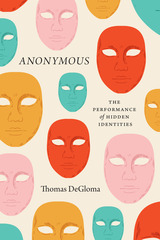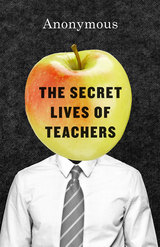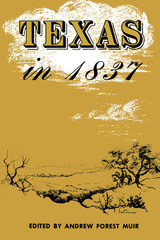
In recent years, anonymity has rocked the political and social landscape. There are countless examples: An anonymous whistleblower was at the heart of President Trump’s first impeachment, an anonymous group of hackers compromised more than 77 million Sony accounts, and best-selling author Elena Ferrante resolutely continued to hide her real name and identity. In Anonymous, Thomas DeGloma draws on a fascinating set of contemporary and historical cases to build a sociological theory that accounts for the many faces of anonymity. He asks a number of pressing questions about the social conditions and effects of anonymity. What is anonymity, and why, under various circumstances, do individuals act anonymously? How do individuals accomplish anonymity? How do they use it, and, in some situations, how is it imposed on them?
To answer these questions, DeGloma tackles anonymity thematically, dedicating each chapter to a distinct type of anonymous action, including ones he dubs protective, subversive, institutional, and ascribed. Ultimately, he argues that anonymity and pseudonymity are best understood as performances in which people obscure personal identities as they make meaning for various audiences. As they bring anonymity and pseudonymity to life, DeGloma shows, people work to define the world around them to achieve different goals and objectives.

What it’s really like to be a parent in the world of higher education, and how academia can make this hard climb a little less steep
Academia has a big problem. For many parents—especially mothers—the idea of “work-life balance” is a work-life myth. Parents and caregivers work harder than ever to grow and thrive in their careers while juggling the additional responsibilities that accompany parenthood. Sudden disruptions and daily constraints such as breastfeeding, sick days that keep children home from school, and the sleep deprivation that plagues the early years of parenting threaten to derail careers. Some experience bias and harassment related to pregnancy or parental leave. The result is an academic Chutes and Ladders, where career advancement is nearly impossible for parents who lack access to formal or informal support systems.
In The PhD Parenthood Trap, Kerry F. Crawford and Leah C. Windsor reveal the realities of raising kids, on or off the tenure track, and suggest reforms to help support parents throughout their careers. Insights from their original survey data and poignant vignettes from scholars across disciplines make it clear that universities lack understanding, uniform policies, and flexibility for family formation, hurting the career development of parent-scholars. Each chapter includes recommendations for best practices and policy changes that will help make academia an exemplar of progressive family-leave policies. Topics covered include pregnancy, adoption, miscarriage and infant loss, postpartum depression, family leave, breastfeeding, daily parenting challenges, the tenure clock, and more. The book concludes with advice to new or soon-to-be parents to help them better navigate parenthood in academia.
The PhD Parenthood Trap provides scholars, academic mentors, and university administrators with empirical evidence and steps to break down personal and structural barriers between parenthood and scholarly careers.

This is not a how-to manual. Rather, the author explores the dimensions of teaching that no one else has, those private thoughts few would dare put into a book but that form an important part of the day-to-day experience of a teacher. We see him ponder the clothes that people wear, think frankly about money (and the imbalance of its distribution), get wrangled by parents, provide on-the-fly psychotherapy, drape niceties over conversations that are actually all-out warfare, drop an f-bomb or two, and deal with students who are just plain unlikeable. We also see him envy, admire, fear, and hope; we see him in adulation and uncertainty, and in energy and exhaustion. We see him as teachers really are: human beings with a complex, rewarding, and very important job.
There has been no shortage of commentary on the teaching profession over the decades, but none quite like this. Unflinching, wry, and at times laugh-out-loud funny, it’s written for every teacher out there who has ever scrambled, smirked, or sighed—and toughed it out nonetheless.

Written anonymously in 1838–39 by a "Citizen of Ohio," Texas in 1837 is the earliest known account of the first year of the Texas republic. Providing information nowhere else available, the still-unknown author describes a land rich in potential but at the time "a more suitable arena for those who have everything to make and nothing to lose than [for] the man of capital or family."
The author arrived at Galveston Island on March 22, 1837, before the city of Galveston was founded, and spent the next six months in the republic. His travels took him to Houston, then little more than a camp made up of brush shelters and jerry-built houses, and as far west as San Antonio. He observed and was generally unimpressed by governmental and social structures just beginning to take shape. He attended the first anniversary celebration of the Battle of San Jacinto and has left a memorable account of Texas' first Independence Day. His inquiring mind and objective, actue observations of early Texas provide us a way of returning to the past, revisiting landmarks that have vanished forever.
READERS
Browse our collection.
PUBLISHERS
See BiblioVault's publisher services.
STUDENT SERVICES
Files for college accessibility offices.
UChicago Accessibility Resources
home | accessibility | search | about | contact us
BiblioVault ® 2001 - 2024
The University of Chicago Press









